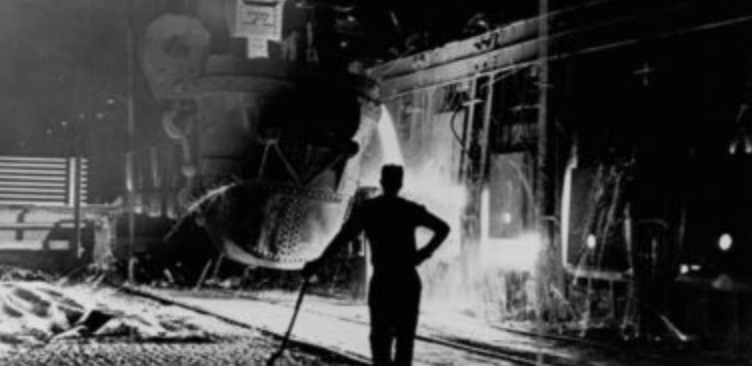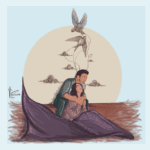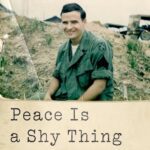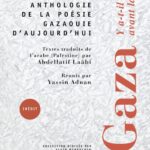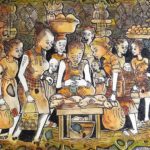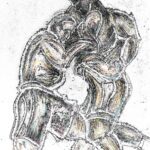Acrostic: Grandmother Mary and the Great War
Could this be the river that burned?
Under late summer’s waning moon
yellow star-points of fireflies flashed on
and off in evening’s mists, constellations rearranging themselves through
haze high above avenue lamps that blinked
open as dark awakened. City of Forests they called it
the summer that seventeen-year-old Mary,
good gemütliche daughter of Over-the-Rhine brewers, stepped on
to the Union Station platform for the first stop since Cincinnati.
She gazed through Cleveland’s coal-sulfur gloom
at a distant gleam of river, then turned with the whistle’s shrill
and re-boarded the third-class coach with her
one-way ticket to New York and a contract as nanny for a few spoiled
scions of Wall Street. Was it one Sunday’s tea dance
or Friday’s sawdust-floored saloon where she first sighted
Harry, dashing livery driver and bon vivant, who inveigled her hand and
invested his fares on ponies at Belmont? Closing the books years later on his
overnight shifts, he drove away from Richmond Hill. She
raised their daughters as the miasma of War meant To End All Wars
infected the coke and rolling mills back home with
Vulcan’s furor. Her only brother walked away from Bethlehem Steel,
entered the regimental lists, marched onto the flag-draped
troop ship, and disappeared into history’s
reversed mirror image. For her no
victory at Armistice, treaty signed at the eleventh hour
in a private railway carriage, but a season of ragged woolen serge
and chill-chapped hands, and coughing. Her second daughter
lost to fever as ships steamed home, teaming with no one
who could name her. Mary’s first tongue returned,
lamented in defeated syllables. What private terms for bonds
forged in the crucible of war, humors
unfurling their mortal warning colors?
Elemental circles of smokestacks glowed with rolling fire
on the river’s slow brimming as Mary strode the thronged
streets alone. Could she have known, for her vestige of
years, that she would yield to her remaining daughters, home
by home, dwelling within that older tongue
like a solstice lit from within?
______________________________________________________________________________________________________
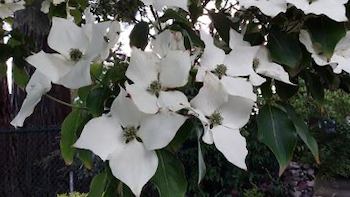
Round: When Dogwoods Flower
(Allison Krause, Jeffrey Glenn Miller, Sandra Scheuer, Bill Schroeder Kent State University — May 4, 1970)
When dogwoods flower, I think of you
under the season’s high clouds, the weather’s
contradictions, where you walked to class
for the last time, Sandra, hefting your textbooks
with their speech patterns and throat’s unanswered
questions. You glanced at classmates who brandished
flags and shouted slogans at young men
in helmets and uniforms retreating
up the hill, cradling their M-1 rifles
as they turned to glance back down the slope,
but you hurried across the parking lot toward class.
What had you learned about the history
of speech, and what could you tell us
about the season’s explanations
if you could turn back those thirteen seconds
of live fire, the body count of clouds,
black and white weather patterns
of the national news?
~
What had history
taught you, Bill, about the distant war
as bombers’ shadows like wavering X’s
slid across Cambodian forest cover?
Your military science texts explained
how each X marked a spot gliding
over unscarred foliage, a moving target’s
payload. What could your class in combat
psychology reveal about moving targets
as you paused on that spot in the distant parking
lot, then stepped across some unseen
line into M-1 bullets’ sideways hail?
Shouts and tear gas volleys faded
to silence as your class notes scattered
like black and white leaves of official
contradictions, and spring’s distant storms
turned in their tracks, erasing their own
explanations.
~
What were the speech patterns
of the national news, Jeff, as you strode
with others chanting that the Southeast Asian
war was wrong? Early May’s barely-leafed
branches filtered contradictory sun, and
uniformed and helmeted young men hefted
their weapons as they glanced back toward
the parking lot where other young men
shouted that the war was wrong. You asked
“Where Does It End?” of the retreating storms
as if reliving your high school poem
while guardsmen mounting the crest of the hill
wheeled in unison, aimed, and fired
into your unanswered question. Black and white
photos cried out and the national news ended
for you as the official explanation slammed
into your mouth and exploded at the base
of your brain. You fell at the feet of
a girl who fell to her knees and screamed
into history, her O-mouth the black
hole of your absence.
~
“What’s the matter
with peace?” Your question, Allison,
as you snatched the unexplained lilac
sprig from a friendly guardsman’s gun barrel
before his commanding officer could fling it
to the pavement.
“Flowers are better
than bullets!” you shouted to the CO’s
retreating back. Did you arrange it in
a vase in your dorm room, and in nightmares
filled with official body counts,
did you fall on that flower
like a live grenade to save the national
news from its impact?
You stamped your feet
and screamed at troops advancing up the hill
that final morning, your eyes streaming
through tear gas clouds as you stood your X-
marked ground and demanded explanations.
“What’s the matter with peace?” you cried
into history, as gravel found later
in your pockets justified the live
rounds that seemed to leap of their own
volition from the M-1 barrels.
~
Meanwhile, on broad lawns of the provost’s
mansion, the governor grimaced for photo-ops
and calculated his Senate campaign’s
chances: Monday, 12:24 P.M.
how many live rounds fired in unison
for which no one gave an order, no one
fired a warning shot, no one but
the unarmed could be blamed? The unarmed
collapsed into their own bloodfall, the last
flash of understanding in the cells,
and crossed into history’s contradictions.
“What’s the matter with peace?” their voices
cry in unison into silence’s unanswered
weather, trajectory of storms that give
no warning shots, the season’s high clouds
that blame no one, we survivors who walk
across early May’s memorial ground
and think of them when dogwoods flower.
Carolyne Wright
Carolyne Wright's most recent books are Masquerade, a memoir in poetry (Lost Horse Press, 2021), and This Dream the World: New & Selected Poems (Lost Horse, 2017), whose title poem received a Pushcart Prize and appeared in The Best American Poetry. She has nine earlier books and chapbooks of poetry; a ground-breaking anthology, Raising Lilly Ledbetter: Women Poets Occupy the Workspace (Lost Horse, 2015), which received ten Pushcart Prize nominations; and five award-winning volumes of poetry in translation from Bengali and Spanish—including Map Traces, Blood Traces / Trazas de mapa, trazas de sangre (Mayapple Press, 2017) by Seattle-based Chilean poet, Eugenia Toledo (Finalist, 2018 Washington State Book Award in Poetry, and 2018 PEN Los Angeles Award in Translation). A Contributing Editor for the Pushcart Prizes, Carolyne lived in Chile and traveled in Brazil on a Fulbright Grant; on her return, she studied with Elizabeth Bishop at the University of Washington. Carolyne returned to Brazil in 2018 for an Instituto Sacatar artist's residency in Bahia. A Seattle native who teaches for Richard Hugo House, she has received grants from the NEA, 4Culture, and the Radcliffe Institute, among others. A Fulbright U.S. Scholar Award to Brazil took her back to Salvador, Bahia, in mid-2022; with another two months in 2024.
